
General Psychiatry Residency Program: Training Sites
Outpatient
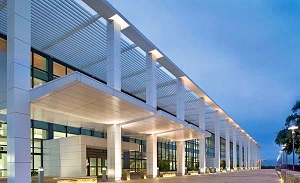 Wilford Hall Ambulatory Surgical Center
Wilford Hall Ambulatory Surgical Center
Wilford Hall Ambulatory Surgical Center is a large multidisciplinary outpatient medical facility located on Lackland Air Force Base. Housing more than 25 clinical services and serving more than 55,000 patients, it is the Department of Defense’s largest outpatient ambulatory surgical center. Beginning in PGY2 year, psychiatry residents who belong to the Air Force joint program complete their psychotherapy training in the Wilford Hall mental health clinic. They also spend part of their PGY3 longitudinal outpatient rotations at the mental health clinic. Other outpatient clinical experiences available at Wilford Hall include child and adolescent psychiatry and military forensic psychiatry.
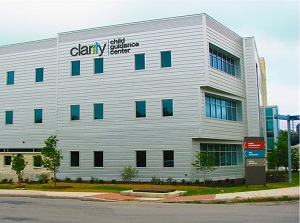 Clarity Child Guidance Center
Clarity Child Guidance Center
Clarity Child Guidance Center is the only not-for-profit mental health treatment center specializing in children ages 3-17 in San Antonio and South Texas. Their inpatient and outpatient programs incorporate a range of services including crisis stabilization, psychiatric evaluations, and ongoing therapy. Clarity is closely affiliated with UT Health San Antonio Department of Psychiatry and provides training opportunities for our residents to work alongside the child and adolescent fellows in the outpatient setting. PGY2 and PGY3 residents complete a longitudinal outpatient rotation that provides robust training in the treatment of both common and serious mental health disorders of childhood and adolescence.
 UT Health Behavioral Health and Wellness Center
UT Health Behavioral Health and Wellness Center
The BRAND NEW Eckhert building is now the home of the UT Health Behavioral Health and Wellness Center! Multiple UT Health outpatient clinics including the Transitional Care Clinic (TCC), New Opportunities for Wellness Clinic (NOW), and Advance clinic (therapy) all utilize this new building. These mental health clinics allows residents to appreciate the satisfaction of providing psychiatric care in a community psychiatry setting. PGY3 residents complete 1-year longitudinal outpatient experiences at the clinic working with a strong multi-disciplinary team and dedicated attending supervision. They gain robust exposure to the outpatient psychopharmacological management of serious mental illness, substance use disorders, and severe personality disorders. They also have the opportunity to gain exposure to specialized psychotherapies, including those for PTSD (CPT), borderline personality disorder (DBT), and schizophrenia (CAT). There are also elective opportunities for interventional psychiatry (including TMS, ketamine, and ECT) at this clinic.
Transitional Care Clinic (TCC) program
This program provides psychiatry and psychotherapy services to patients who have recently been hospitalized and is supported by multi-million-dollar state and local funding. The program serves an important role in the community by providing a bridge to long-term mental health services for vulnerable, high-risk patients, thereby reducing their risk of re-hospitalization.
The New Opportunities Clinic
This clinic provides San Antonio with rapid appointments for professional, outpatient behavioral health services including psychiatric medication management, group and individual counseling, and care coordination. For most individuals, behavioral health difficulties are sporadic or episodic, meaning they occur periodically over months and years. The Behavioral Health NOW Program accommodates this pattern by providing clients intensive services early in treatment and during periods of exacerbation, and then providing less-intensive services during periods of greater wellness.
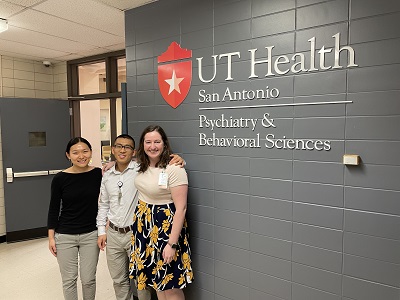 UT Health Advance Clinic
UT Health Advance Clinic
This is a UT Health San Antonio outpatient mental health clinic that serves as the main longitudinal psychotherapy clinic for residents. Starting in PGY2, civilian and active-duty residents begin incorporating theoretical knowledge learned in psychotherapy didactics to direct patient care in weekly psychotherapy cases. Residents then discuss cases with their psychotherapy small groups, made up of other residents and a faculty supervisor.
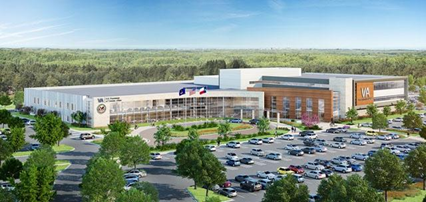 VA Outpatient Clinics
VA Outpatient Clinics
The South Texas VA Health System operates a vast and diverse network of outpatient mental services for the large population of military veterans in the San Antonio area. PGY3 Psychiatry residents complete longitudinal outpatient rotations in a variety of adult outpatient psychiatric clinics that are located at the Audie L. Murphy hospital, the new North West clinic, and the Balcones Heights Outpatient Clinic. Residents may also rotate through the VA Polytrauma Center, providing psychiatric care to veterans with traumatic brain injuries; the Prime Clinic, managing patients with severe psychotic or mood disorders; or a variety of other clinic options. PGY2 residents now spend a month learning about treatment resistant disorders through our interventional psychiatry rotation at the VA, which includes exposure to TMS, ketamine, and ECT.
 UTSA Clinic
UTSA Clinic
The University of Texas at San Antonio (UTSA) is a large public university with over 30,000 students and 150 different degree plans! The Counseling and Mental Health Services (CMHS) provides students a diverse range of therapeutic resources from individual and group counseling, biofeedback tools, mental health workshops, substance recovery programming, and case management. Approximately 9% of the total UTSA student population receive services through CMHS. Conditions treated at CMHS range from situational stressors and ADHD to severe mental illness. The counselors and staff value and support our psychiatry residents to provide a solid foundation in college mental health.
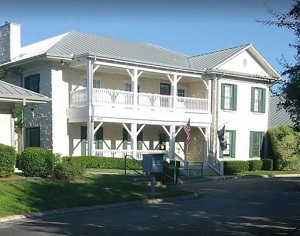 Villa Serena
Villa Serena
Villa Serena is a rehabilitation center for male and female veterans with substance use disorders and is affiliated with the South Texas VA Health System. During their PGY2 year, residents complete a one-month addiction psychiatry rotation at Villa Serena. They are involved in evaluation and treatment planning for veterans to determine the need for intensive outpatient programming or admission to one of three residential treatment tracks. These tracks include a 45-day “Substance Use Disorder” track that employs Motivational Interviewing in an interdisciplinary team approach, a 28-day “Resiliency and Mental Health” track that is designed to identify and treat underlying psychodynamic-triggers and develop coping skills, and a 60-day “Self-Sufficiency” track whose mission is to integrate veterans back into the community with stable housing and gainful employment. Residents also participate in the initial evaluation of the buprenorphine program, as well as the induction process and ongoing treatment for veterans maintained on buprenorphine.
